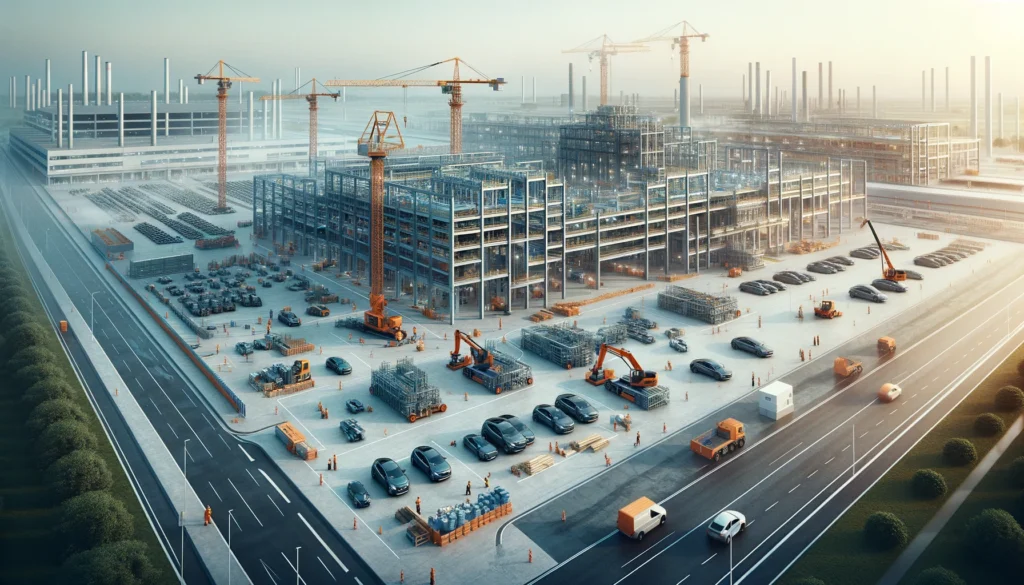The state of Georgia has been eagerly anticipating the construction of the Rivian assembly plant in Morgan County, with over $200 million already invested in preparing the site and infrastructure for the project. However, recent developments have revealed that Rivian has decided to pause the construction of its electric plant in Georgia, raising concerns and uncertainties among state officials and lawmakers.
Background of the Rivian Assembly Plant Project
Rivian, an electric automaker known for its innovative all-electric trucks and SUVs, had initially planned to establish a major production facility in Georgia. The state had been actively involved in supporting the project, with significant investments made in site preparation, road upgrades, and infrastructure development. The total amount spent by Georgia taxpayers on these projects amounted to $299 million, with no direct payments made to Rivian.
The decision to pause the construction of the Georgia plant came as a surprise to many, especially considering the substantial investments already made by the state. Rivian cited the need for cost efficiency and long-term growth as reasons for delaying the project. The company revealed a $5.4 billion net loss in its annual financial results, prompting a strategic reassessment of its manufacturing plans.
Impact on Georgia’s Economy and Future Prospects
The pause in construction of the Rivian plant has raised concerns about the economic impact on Georgia and the potential loss of job opportunities that the project promised to bring. State officials, including economic development director Pat Wilson, have expressed hope that Rivian will eventually resume the project, given the quality of the company’s products and the preparedness of the site for future development.
Despite the uncertainty surrounding Rivian’s plans, Wilson emphasized that the state’s investment in infrastructure improvements has increased the site’s value and attractiveness for future projects. Should Rivian decide to abandon the Georgia plant altogether, the state has legal mechanisms in place to seek alternative job-creating opportunities for the site.
Rivian’s Revised Manufacturing Strategy
In light of the construction pause in Georgia, Rivian announced that it would shift production of its upcoming R2 SUVs to its existing plant in Normal, Illinois. CEO RJ Scaringe explained that this decision was aimed at accelerating production timelines and reducing capital spending in the short term. The company plans to launch the R2 SUVs in 2026, leveraging its Illinois facility to meet market demands more effectively.
The unexpected announcement of additional R3 and R3X crossover models further underscores Rivian’s commitment to expanding its product lineup and enhancing its manufacturing capabilities. While the pause in Georgia construction may have raised doubts about Rivian’s future plans, the company’s strategic realignment signals a proactive approach to addressing financial challenges and optimizing production processes.
Future Outlook for Rivian and Georgia’s Automotive Industry
As Rivian navigates the complexities of the electric vehicle market and strives for sustainable growth, the decision to pause construction in Georgia reflects the company’s adaptability and focus on operational efficiency. While uncertainties persist regarding the resumption of the Georgia plant project, Rivian’s commitment to innovation and product development remains unwavering.
For Georgia, the outcome of the Rivian project will shape the state’s automotive industry landscape and economic prospects in the years to come. The pause in construction serves as a reminder of the inherent risks and challenges associated with large-scale manufacturing investments, prompting stakeholders to reassess priorities and strategies for attracting and retaining automotive companies.
In conclusion, the Rivian plant construction pause in Georgia represents a pivotal moment for both the company and the state. The decision underscores the dynamic nature of the electric vehicle market and the importance of strategic planning in the automotive industry. As Rivian recalibrates its manufacturing strategy and Georgia evaluates its economic development priorities, the path forward will require collaboration, innovation, and adaptability to navigate the evolving landscape of electric vehicle production.


